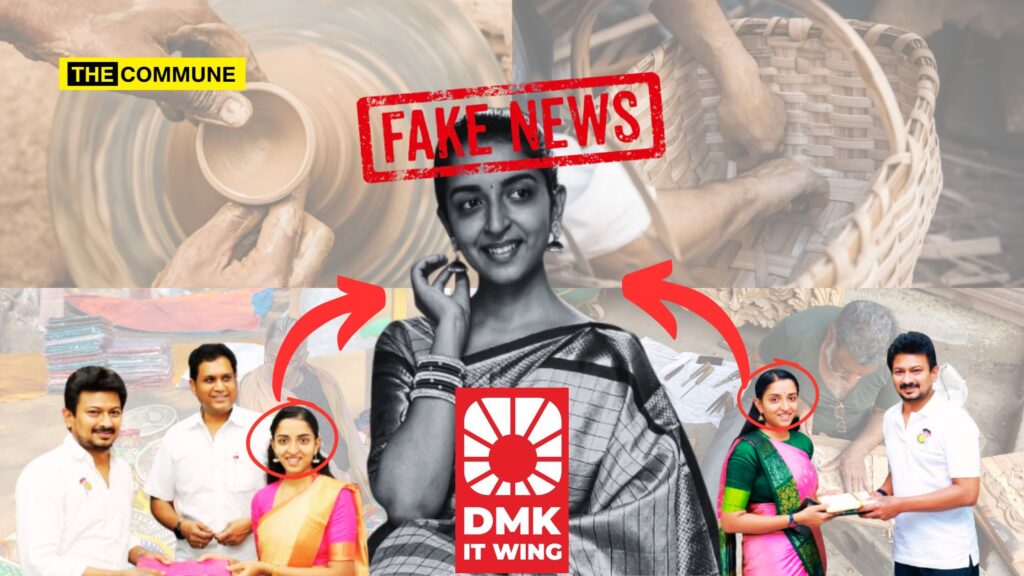Padma Priya, a YouTube beautician who gained attention through her so-called ‘environmental activism’ video and later transitioned into politics by joining Kamal Haasan’s Makkal Needhi Maiam before becoming a DMK IT Wing functionary, has spread blatantly false information about the Prime Minister Vishwakarma Scheme in an attempt to target the Narendra Modi government.
In a video titled “Hereditary Education Scheme 2.0, The Scheme That Was Abolished Is Being Brought Again By Modi” in Tamil, DMK IT Wing State Deputy Secretary Padma Priya goes on to say “Kids of those who stitch slippers have to do only stitching slippers. A barber’s son should become only a barber. Those who make garlands, nets, pots, and washermen – all their children have to do only their hereditary jobs. Students who have completed 18 years of age, instead of going to college to become doctors, engineers, scientists, and government officials, if they’re ready to learn their hereditary jobs, the Union BJP government is giving an incentive of ₹500 and promoting their hereditary jobs. This scheme, which on hearing makes us frown, is called Vishwakarma Yojana.”
She further goes on to say “Teaching students of 18 years and above a vocational skill is not wrong but this scheme incentivizes only children of specific communities and this Vishwakarma scheme has been introduced to promote only these 18 professions.”
She claims that the PM Vishwakarma Scheme has been brought in only to incentivize professions done by communities who are socially and economically backward.
She also peddles false information that unemployment rate has been rising in India when infact it has been the opposite. In April to June 2024, India’s unemployment rate was 6.6%. This is a slight decrease from the previous quarter, when the rate was 6.7%.
“PM Amit Shah.. Sorry.. PM Modi instead of taking forward, you know where he is taking India by now.“, she says.
The Truth About PM Vishwakarma Scheme
The PM Vishwakarma Scheme, launched by Prime Minister Narendra Modi in September 2023, is a government initiative aimed at supporting traditional artisans and craftspeople across India. The scheme is named after Vishwakarma, the Hindu deity associated with craftsmanship, and is designed to empower those involved in traditional skills that are often passed down through generations. It is a Central Sector Scheme which means that it is fully funded by the Central Government.
1. Target Beneficiaries: The scheme focuses on artisans and craftsmen like carpenters, blacksmiths, goldsmiths, potters, tailors, weavers, and other traditional workers who rely on their manual skills for livelihood.
Busting The Myths Of PM Vishwakarma Scheme
Myth: The scheme promotes caste-based professions.
Fact: No, caste is not an eligibility criterion for the PM Vishwakarma Scheme. The scheme focuses on providing support to individuals engaged in traditional craftsmanship and artisanal professions, such as carpenters, blacksmiths, goldsmiths, potters, tailors, and other similar trades, regardless of their caste background. The eligibility is based on the type of profession, not caste, with the goal of helping traditional artisans and craftsmen, many of whom may come from historically marginalized communities, but caste itself is not a determining factor.
The emphasis is on promoting and supporting traditional skills, enhancing livelihoods, and providing financial assistance, training, and market access to those already involved in these professions.The goal is to empower artisans, not to reinforce caste-based roles.
Myth: The scheme encourages students to leave their education for traditional professions.
Fact: The scheme is NOT intended for students to abandon their studies and pursue traditional professions. It is designed for individuals who are ALREADY employed or self-employed in one of the 18 traditional professions, offering them support such as technology assistance, loans, insurance, and more. If you are currently a goldsmith, carpenter, mason, or involved in any of these trades, you are eligible to register. It provides financial aid, skill development, and technological assistance to enhance their livelihoods, not to draw new entrants away from education.
Myth: The scheme is only for people practicing hereditary occupations.
Fact: While the scheme supports traditional professions, it does not limit eligibility to those who have inherited these skills from their families. Anyone currently working in the listed professions can apply for benefits under the scheme. For example, a father might be a mason, while the son is free to pursue any career, such as becoming an engineer or a doctor. However, suppose the son has already become a goldsmith or chosen any of the 18 listed professions (which doesn’t have to match the father’s occupation). In that case, he is still eligible to benefit from the scheme.
Subscribe to our Telegram, WhatsApp, and Instagram channels and get the best stories of the day delivered to you personally.

